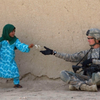Spennandi skrif um lausn á Írak vandamálinu
17.5.2007 | 09:38
Þar sem ástandið i Írak og á öðrum stöðum þar sem óréttlæti ríkir liggur mér þungt á hjarta,les ég ýmislegt um þau efni og reyni að fylgjast með því sem er að gerast eins vel og mér er mögulegt.
Þessi grein um mögulegar lausnir með Írak, finnst mér mjög áhugavert og hvet fólk að lesa.
Ljós og kærleikur til ykkar.
by Rinaldo S. Brutoco
Founder and CEO, World Business Academy
A commentary on business
and civil society
/
“Iraq”—
Exit from a Quagmire
“In this regard and with my heart filled with sadness, I have to say that it is my
belief that there is no Iraqi people inside Iraq. There are only diverse groups with
no national sentiments.“
— Faisal I, first King of Iraq, 1932
Background
I
t is no surprise
that the regional conference on Iraq held in Egypt last week
failed to stop the bloodshed. No one can find a “solution”for Iraq with-
out starting at the beginning of the story. Sadly, the beginning of the story
is that there really never was a nation called “Iraq.”It never existed. It still
doesn’t exist. It is not likely ever to exist.
Some years ago, purportedly on Winston Churchill’s instructions, a British
map maker drew a few lines on a piece of paper and conjured up the illusion
of “Iraq”as a convenient way of administering a Middle East region poten-
tially rich in oil. With unrestrained brutality, Saddam Hussein kept that illu-
sion alive by subjugating three very different groups of people, the Sunni,
the Shi’a, and the Kurds. No national glue held those three captured peoples
together. Now that Hussein’s iron hand is gone, buried anger from centuries
of ethnic and religious conflicts and rivalries has erupted. These internal con-
flicts have been inflamed by a host of external factors, including interven-
tion by the American armed forces (and to a lesser extent the British), incur-
sions by Muslim fundamentalists from other parts of the Middle East, Saudi
financing, and Iranian meddling. The civil war that erupted from all of those
interactions rages on with a vengeance.
As time went by, the Bush Administration offered an ever-changing series
of justifications for invading “Iraq.”It is beyond the scope of this paper
to decide whether those reasons were legitimate, or, as the international
May 9, 2007
Volume 21 • Issue 1
/
community now has overwhelmingly concluded, illegitimate. All political
groups within the U.S., the vast majority of people in “Iraq,”and the vast
majority of people around the globe have concluded that the U.S. bears a
tremendous responsibility for what has happened in “Iraq.”All sides believe
that the U.S. has been hitting a hornet’s nest with a stick and doesn’t know
how to stop.
Almost 4,000 U.S. soldiers have died and more than 15,000 have been
wounded or maimed. These numbers do not include mercenary contrac-
tors. At least 100,000 Iraqis have died, and the UN thinks the true Iraqi death
total is closer to 350,000. New life has been breathed into Al Qaeda, and an
entirely new generation of Muslim youth has been radicalized. The physical
infrastructure of “Iraq”has been destroyed and there is no hope of its repair
in less than a decade or two. “Iraq”has gone from being an exporter to an
importer of oil and it pumps less oil today than when the war began. Medi-
cal and civil society support systems in Syria and other neighboring coun-
tries are being overrun by millions of refugees. Iran has been handed control
of the largest, most oil-rich portion of “Iraq”— without firing a single bullet
— after fighting an eight-year war with Hussein to a draw for a fraction of
the territory it now controls. And the most far-reaching consequence of all
is that the balance of power among Sunni and Shi’a countries in the Middle
East has been dramatically altered for the first time in centuries (see Vali
Nasr’s The Shia Revival for an excellent review of the massive implications of
this for instability in the Middle East).
There is no question that a full-blown civil war is now raging and that the
U.S. is going to leave “Iraq,”whether it likes it or not. It appears that Ameri-
cans are going to force an end to the war to stop the loss of life and the
unending drain on the U.S. treasury. If this drain continues, it could seriously
impair the world financial markets. Americans must ask how they can extri-
cate themselves given their moral responsibility to the people in “Iraq,”the
Middle East, and the entire industrial world that runs on oil. What can the
U.S. do in the course of getting out that limits further harm from the U.S.
invasion and occupation?
An Important History Lesson
We often look to both the living and the dead for help in solving great moral
dilemmas. In 1947, Mahatma Gandhi struggled with the seemingly intracta-
ble divide between Hindus and Muslims living in the recently freed state of
India. As India’s Founding Father, he did everything he could to keep his na-
tion together. As he demonstrated numerous times and in numerous ways,
he was willing to personally die for that cause. He hunger-fasted to the point
of death in his attempt to reconcile Hindus and Muslims. Eventually, he real-
ized that there was no way to keep the two civil war factions forcibly locked
in the same national system and that there would be far less bloodshed if he
gave up that dream. To achieve the greater good, he allowed Pakistan and
India to be partitioned. It was, he eventually concluded, the only practical
alternative. Like Gandhi in his time, we must recognize that, today, partition
is the only practical alternative for “Iraq.”
/
Who Is Gone, Who Is Left
Whoever the “moderate”Iraqis were, they seem to be in scarce supply today.
Those who are in “Iraq”today have been radicalized. Yet it is these very same
people whom we must try to help create a stable society that will reject
further radicalism and repel a resurgent Taliban movement.
Most of the upper classes and the well-educated have long since fled “Iraq.”
Those who remain are the poorest and the least educated. More ominously,
those who remain are, increasingly, the religious fundamentalists. The very
poor have no option but to risk their lives and struggle with the daily ran-
dom violence, deplorable living conditions, and chaotic breakdown of civil
society. A recent poll showed that 77% of Iraqis preferred Saddam’s rule to
the current situation. As the U.S. extricates itself, it has a moral obligation to
do its best to protect this civilian population from further death and destruc-
tion. Protecting that population is also a practical necessity if we want to
increase the chance of regional stability in the coming decades. The “right”
thing to do is also the wisest thing to do even as the U.S. prepares to pull its
military out of “Iraq.”
An Outcome: Facilitating Relocation and“Homeland Security”
For Three New Nations
We propose that the U.S. convene a regional peace conference and immedi-
ately declare that it favors creating a new nation for each of the three major
population groups. The borders should be based upon the three groups’
present geographical distribution. “Iraq”should be partitioned into a Shi’a
nation in the midsection down to the southern section; a Sunni nation from
the midsection up to the north as far as the Kurdish homeland, and west to
the edge of the present “Iraq”border; and a Kurdish nation with borders trac-
ing the informal borders of the Iraqi Kurdistan that already exists and already
operates much like a separate country. All U.S. troops should be used to
enforce the integrity of these borders — a far simpler and more achievable
task for the troops than attempting to continue their occupation of the entire
country.
Within these new borders, there will be pockets of Shi’a within Sunni neigh-
borhoods and pockets of Sunni within Shi’a neighborhoods. The U.S. should
encourage the relocation of the minority population in each neighborhood by
purchasing the houses of Sunnis in Shi’a neighborhoods who agree to move
to a Sunni neighborhood, and the houses of Shi’a in Sunni neighborhoods
who agree to move to a Shi’a neighborhood. This will leave each of these two
warring factions with their own“homeland”to secure and preserve. The house
payments will enable those who relocate to purchase new dwellings of compa-
rable value in the homeland of their respective religious factions. The houses
left empty in the two homelands will provide the housing authorities there
with housing stock for families whose homes were destroyed earlier in the war
who need a place to live in their respective homelands.
/
A Timetable
The U.S. should declare at the peace conference that it will pull its military
forces out of “Iraq”within 180 days from the start of the conference, leaving
each homeland in charge of its own internal security and border defense. This
180-day period would be broken into Phase I and II, each lasting 90 days.
During Phase I, the U.S. should make the payments for home relocation with
no strings attached. Phase I is designed to provide enough time for the exist-
ing inhabitants of the most violent mixed neighborhoods to elect to move to
a safe homeland that would be composed of their principal religious faction.
During this first phase, the U.S. would station troops on the borders of the
three new homelands to ensure that no invaders or “outsiders”cross into them.
The U.S. military would essentially provide border security services — a far
simpler task than its current mission, and undoubtedly less costly in terms of
human life.
During Phase I, the U.S. would work with the military and police forces of the
three homelands to prepare them to assume joint responsibility for border
security and true internal security for their respective homelands. The separa-
tion of the various factions will greatly reduce if not eliminate the ability of any
faction’s death squads to attack another faction.
Phase II begins at the end of Phase I with each homeland’s military and police
forces joining the U.S. military on its borders. During Phase II, each homeland
would assume 100% responsibility for its internal security, and the homelands
would jointly man their borders from their respective sides in conjunction with
U.S. troops on both sides of each border. This would teach each homeland how
to maintain border security after the U.S. military departs. In all cases, the bor-
der troops of each homeland would serve alongside U.S. troops who would be
stationed on both sides of each border to guarantee border security and pro-
tect each border from a rampage by any side. Maintaining this border security
is far less dangerous for the Americans, and far less expensive, than attempting
to maintain control over Baghdad and other major cities. This is the way a time-
table can be set without creating more chaos in an already chaotic situation. As
such, it is what American politicians are looking for and a plan that the military
can execute without unnecessary losses of military or civilian lives.
After the end of Phase II, the U.S. would leave and each homeland would be
responsible for defending itself as every country in the Middle East currently
does irrespective of whether it is Sunni or Shi’a. It should be assumed that Iran
would continue to try to run the Shi’a homeland and, along with other Shi’a
nations, would assist that new nation financially and militarily. It should also be
assumed that the Saudis and other Sunni nations would continue to arm and
financially support the Sunni homeland. The Kurds appear to be strong enough
by themselves to provide for their own defense after the 180-day period has
run, and would be supported by their oil wealth together with U.S. and UN
reconstruction aid.
Following the last withdrawal of U.S. forces, the U.S. should supply adequate
aid and development funds to assist with the reconstruction of the three
homelands. The U.S. should also attempt to bring the United Nations, the
/
European Union, the World Bank, and International Monetary Fund into the
funding cycle so that reconstruction and development of the homelands can
be accomplished with all deliberate speed. This would bring greater stability
to those unfortunate people whose lives have been so badly disrupted, while
simultaneously bringing greater volumes of crude oil to world markets and
reducing tensions in the Middle East. Reconstruction and development funds
should be allocated to the homelands that sustained the greatest damage
from the invasion and occupation provided: (a) the recipient homeland con-
tinues to conduct itself as a non-threatening party with respect to the other
homelands and other border states, and (b) refrains from offering sanctuary
to any militant, fundamentalist training camps. These funds will add to the
stability of the homelands while they rebuild their civil societies.
There is no reason to require the three homelands to be part of one feder-
ated state. There is no hope of success from the loose federation proposed by
others such as Peter Galbraith, Leslie Gelb, and Ralph Peters who recognize,
as Galbraith succinctly put it, that “Iraq is not salvageable as a unitary state.”
An imposed, weak federated state would be likely to collapse, creating even
more obstacles to peace. A federation is not necessary to achieve the legiti-
mate goals of U.S. policy for the Middle East, so it should not be a precondi-
tion for moving forward. It is clearly impossible to achieve on any lasting
basis. As we often say in the Academy, we must avoid letting the “perfect”
solution be the enemy of the “good”solution. Partition without federation
could be achieved in 180 days. It would create a platform which virtually all
U.S. politicians could support, and would begin the process of stabilizing the
Middle East. It would also provide a formula for ending a crisis that is radical-
izing more Muslim fundamentalists each day that we continue on the present
course. An attempt to create a federal state will only prolong the agony of
“Iraq”and further add fuel to an already destabilized Middle East.
As noted above, Gandhi’s solution for India and Pakistan is the model for
“Iraq.”It is not what anyone wanted when this entire misadventure began,
but it is the most humane and wisest solution given where we are.
A Thought about Sunni Oil
Commentators who have objected to the partition of “Iraq”often raise the
issue that a Sunni homeland would not have access to the oil that the Shi’a
homeland would possess. This is true. It is also a red herring. No one guaran-
teed that there would be oil in any other country in the world, so why should
the Sunni homeland be an exception? Furthermore, the Sunni homeland will
be well supported by Sunni states who will want to maintain a regional bal-
ance of power with the Shi’a homeland. The Sunni states of Saudi Arabia, Ku-
wait, Dubai, and the United Arab Emirates all have ample oil and oil revenues
that they can share if they like. The world should let the Sunnis themselves
decide how Sunni oil revenues should be divided among themselves.
External Sunni support will not be the Sunni homeland’s only resource. The
Sunni homeland will also have refineries. The Shi’a neighbors, and perhaps
the Kurds as well, may want their oil refined there. More importantly, the split
between Shi’a and Sunni began approximately 1,400 years ago on the death
/
of the Prophet Mohammed. During the following centuries, they learned to live
in adjoining countries with a balance of power that they knew how to modu-
late and regulate. Their recent fierce bloodletting is the result of members of
one sect feeling doomed to be governed and dominated by the other sect in
a homeland they want for themselves. We can see this in modern day “Iraq”
where the violence is greatest in mixed neighborhoods in which a sect is trying
to “cleanse”the area of the opposite sect. Hence the need to create separate,
independently maintained homelands if the war is to end. On a countrywide
basis, those areas where the population is overwhelmingly dominated by a
particular sect now experience far less sectarian bloodshed.
Under this partition plan, Sunnis, Shi’a, and Kurds will decide for themselves
how best to govern their homelands. The U.S. will extricate itself while preserv-
ing the possibility of more stability in the future and less sectarian slaughter in
the present.
“Good fences make good neighbors.”
- Robert Frost
Homelands versus Fenced Neighborhoods
One current “strategy”for reducing violence in Baghdad is to create com-
pounds by building “fences”or, more accurately, concrete barriers around se-
lected neighborhoods. This strategy is doomed to failure. This is partly because
the sectarian group outside the barrier need only watch individuals or vehicles
leave the compound and then ambush them later in some other unprotected
part of town. The new compounds are merely walled-off neighborhoods which
fall far short of the complete systems for economic and social independence
that homelands would create. Within the walls of the compounds, residents
will be protected from violence and marauding bands of death squads, but
the compounds will fail in their essential objective of bringing city-wide peace
to Baghdad. The walled-off neighborhoods show how “fences”can be used to
separate the warring factions, but this is not enough. The U.S. must go “all the
way”with partition to enable the people living behind the fences to form a
self-governing economic, social, and political system within their homeland.
The U.S. is capable of exiting “Iraq”with honor if it acknowledges the quagmire
that it has stumbled into, accepts responsibility for separating and restoring
order among the warring factions, and adopts the foregoing plan for partition.
This first step on the road to Middle East peace will bring a positive, time-cer-
tain end to hostilities. It will also begin the process of repairing Americans’
tattered reputation around the world. The whole world sees that the U.S. is
trapped in “Iraq”with no idea of how to get out — and the world also sees
that the U.S. will be leaving sooner rather than later. Adopting this partition
plan would begin the process of extricating American forces according to a
timeline that the entire U.S. population can support. Once completed, it also
would begin the healing process in the Middle East. It would free the U.S. to
concentrate on the resurgent Taliban forces in Afghanistan, and to fully engage
in the Middle East peace process between Israel and the Palestinians. It would
/
also begin the process of stabilizing the entire region by stabilizing relations
between the Sunni and the Shi’a.
Since Mahatma Gandhi was the inspiration for the partition plan, it is only
fitting we recall what was inscribed over his tomb: “Think of the poorest per-
son you have ever seen and ask whether your next act will be of any use.”
The citizens of that place we so cavalierly called “Iraq”are poor in financial
terms and absolutely destitute in terms of hope for a positive future. If our
next “act”is to go on patrol one more time in Baghdad, it will be an act of no
conceivable “use.”If the U.S. government unilaterally calls for another peace
conference to end its occupation of “Iraq,”that “act”will be an act of supreme
intelligence and compassion. Aren’t intelligence and compassion what the
U.S. is really all about? Isn’t that why, in better times, we were the light of
freedom that shone throughout the world?
………………………
About the World Business Academy
The process of finding a solution to the “Iraq”quagmire can benefit from the
clarity and efficiency that business brings to apparently intractable social
problems. Iraq has become such a political football that it cannot be solved
without leadership from the business community.
Founded in 1987, the World Business Academy is an international business
association dedicated to the belief that, as the most powerful institution on
the planet, business must take responsibility for the well-being of the whole
of society. To fulfill this mission, we offer this pragmatic proposal for a last-
ing peace based on a business-like assessment of the steps necessary to: (a)
complete an honorable withdrawal of U.S. troops from Iraq within a prudent
timeframe; and (b) reorganize the religious and ethnic groups living in “Iraq”
to minimize future harm to Iraqi civilians and infrastructure
Flokkur: Stjórnmál og samfélag | Facebook



 gunnipallikokkur
gunnipallikokkur
 gudnim
gudnim
 sigynhuld
sigynhuld
 ylfamist
ylfamist
 zordis
zordis
 sigrunsveito
sigrunsveito
 asthildurcesil
asthildurcesil
 ktomm
ktomm
 bobbaff
bobbaff
 evabenz
evabenz
 volcanogirl
volcanogirl
 katrinsnaeholm
katrinsnaeholm
 krummasnill
krummasnill
 hronnsig
hronnsig
 ollasak
ollasak
 landsveit
landsveit
 jyderupdrottningin
jyderupdrottningin
 hlynurh
hlynurh
 gudnyanna
gudnyanna
 ludvik
ludvik
 vogin
vogin
 lindagisla
lindagisla
 disadora
disadora
 danjensen
danjensen
 annabjo
annabjo
 motta
motta
 steistei
steistei
 straitjacket
straitjacket
 hk
hk
 svanurg
svanurg
 artboy
artboy
 zeriaph
zeriaph
 prakkarinn
prakkarinn
 toshiki
toshiki
 leifurl
leifurl
 eggmann
eggmann
 baenamaer
baenamaer
 svavaralfred
svavaralfred
 birgitta
birgitta
 ipanama
ipanama
 gudmundurhelgi
gudmundurhelgi
 birnamjoll
birnamjoll
 alheimurinn
alheimurinn
 martasmarta
martasmarta
 einveil
einveil
 mynd
mynd
 vga
vga
 heidistrand
heidistrand
 vertu
vertu
 bostoninga
bostoninga
 heidabjorg
heidabjorg
 ransu
ransu
 aronsky
aronsky
 manisvans
manisvans
 larahanna
larahanna
 rattati
rattati
 scorpio
scorpio
 helgadora
helgadora
 mjollin
mjollin
 topplistinn
topplistinn
 westurfari
westurfari
 athena
athena





Athugasemdir
Það þarf svo sannarlega að senda ljós og kærleika á þessar slóðir. Vonandi kemst ró á þarna sem fyrst. Þó það sé ekki mjög líklegt.
Ásthildur Cesil Þórðardóttir, 17.5.2007 kl. 13:01
SigrúnSveitó, 17.5.2007 kl. 18:49
Steina, eina sem hægt er að gera við svona, er að biðja fyrir þeim. En góð grein hjá þér og nauðsynlegt að vekja fólk til umhugsunar um þetta. Guð blessi þig Steina mín.
Guðsteinn Haukur Barkarson, 18.5.2007 kl. 07:59
Úff... svona er nú þetta líf. Oft erfitt og ósanngjarnt. Þegar maður kafar í þessi stríðsmál vill manni týnast vitneskjan um það að lífið geti verið gott og fallegt. Það eina sem situr eftir í hjartanu er sorg og örvænting.
Ylfa Mist Helgadóttir, 18.5.2007 kl. 12:57
Fyrir mér helst þetta nú allt í hendur, því miður erum við ekki komin lengra í okkar þróun. það er illska, það er ást, það er níska það er gjafmildi .......... ég tel mikilvægt að vera meðvituð um það sem er að gerast, og eins og þú segir guðsteinn að biðja fyrir þessu. fyrir mér er það samt ekki eina lausnin, ég er á því að þegar maður biður, þá er möguleiki á svari, og það svar á maður að manifestera niður á jörðina. við erum öll bræður og systur og þjáning systra minna og bræðra hvar sem er í heiminum hlýtur að hafa áhrif á mig og mína líðan, þá finnst mér að mér beri skilda til að fylgjast með því sem er að gerast, og ef ég finn eitthvað eins og t.d þessa grein sem mér finnst koma fram með mjög góða lausn þá sendi ég hana út og þeir sem lesa hana og hugsa um þessa lausn sem er með til að senda orku í hugmyndina, sem streymir til þeirra sem hafa möguleika á að láta hana rætast, þannig vil ég meina að við getum haft mun meiri áhrif á það sem er að gerast í heiminum en við gerum okkur grein fyrir.
Þetta sé ég svo glöggt hjá ykkur bloggvinum, þið sendið hugmyndir út í netheim, sem fólk svo les og hugsar um. það sem maður les setur af stað hugsun, sem er orka. þannig að það hefur að mínu mati mikil áhrif á fólk það sem við sendum frá okkur.
sendi ykkur öll kærleik og ljós.
steina
Steinunn Helga Sigurðardóttir, 18.5.2007 kl. 15:19
ljós og kveðjur til þín
halkatla, 18.5.2007 kl. 15:27
Sorgleg er heimska mannsins, þegar hún tekur á sig mynd eyðingar, skapar ótta og vanlíðan. Hver er tilveruréttur litla barnsins sem hefur örkumlast, ekkjunnar sem eftir situr með brotið hjarta, land sem er í valdabaráttu og rústin ein!
Lífið
Guð er með okkur öllum, hverju og einu! Með von um kærleik í hjörtu heimsins.
www.zordis.com, 19.5.2007 kl. 08:36
Eigðu góðan dag.
Hrönn Sigurðardóttir, 19.5.2007 kl. 13:29
Þú ery svo rétt og sönn í huga og duglega að koma okkur til umhugsunar.Takk fyrir það.
Solla Guðjóns, 19.5.2007 kl. 14:27
Þetta er ágæt grein og aðallega finnst mér virðingarvert að þú skulir leggja þig eftir að fylgjast með þessu máli svo náið, því ég held að flestir séu orðnir frekar ónæmir fyrir fréttum af svæðinu - og þar á meðal ég. Ég veit ekki hvort mér finnst hugmyndin góð eða slæm. Ef maður aðhyllist þá hugmyndafræði að landfræðilegar línur eigi að draga í samræmi við þjóðir eða þjóðflokka þá er þetta fín hugmynd. Og ef það er raunverulega þannig að það séu eingöngu þessir hópar, sunni, shitar og Kúrdar sem deila. Því miður hef ég ekki næga þekkingu á innviðum Íraks til að vera með það á hreinu.
Eins og greinarhöfundurinn bendir á þá er einn gallinn við hugmyndina að engin olíugæði yrðu á svæði sunni muslima. Það hlýtur að vega þungt, sérstaklega ef þvinga á þá sunni muslima sem búa á hinum svæðunum til flutninga. Stríð snúast almennt um gæði/auðlindir og vald og þegar svæði eins hópsins hefur ekki sömu gæði og annara þá sé ég ekki grundvöll til sátta.
Ég held að hugmyndir að lausn deilunnar verði að koma frá heimamönnum og þeir verði svo studdir að því friðsamlega markmiði sem þeir telja rétt, hvað sem það nú kann að vera.
Annars takk fyrir greinina og vekja mig til umhugsunar. Nú er ég farin að kíkja í Mellemøsthåndbogen að lesa um Írak:)
Hafðu það sem best.
Jóhanna (IP-tala skráð) 19.5.2007 kl. 15:24
En er ekki erfitt fyrir heimamenn að komast að niðurstöðu lausnar staddir í miðjum hörmungum? Verðum við ekki að hjálpast að...vinna með kærleika og ljosi inn í aðstæður sem eru yfirfullar af ótta hatri og græðgi? Hvernig á móðir sem býr við slíkar aðstæður að senda út ljós. Við hinar murnar verðum að hjálpa til..vegalengdir eru engin fyrirstaða fyrir sendingu ljóss.
Takk Steina mín... Þú ert ötul hjálparmannvera.
Þú ert ötul hjálparmannvera.
Katrín Snæhólm Baldursdóttir, 19.5.2007 kl. 21:17
alveg sammála þér kæra katrín.
ljós til þín og ykkar allra.
steina
Steinunn Helga Sigurðardóttir, 19.5.2007 kl. 21:38
Jú það er erfitt, ég er sammála öllu sem þú segir Katrín. Það er einmitt það sem þarf, að vinna með kærleika og ljósi.
Jóhanna (IP-tala skráð) 19.5.2007 kl. 21:42
Bæta við athugasemd [Innskráning]
Ekki er lengur hægt að skrifa athugasemdir við færsluna, þar sem tímamörk á athugasemdir eru liðin.